Best New Records I Heard in November
Another busy month exploring music from all sorts of styles and places
Taylor Swift – Midnights. “And I swear / I’m only cryptic and Machiavellian / ‘Cause I care.” Hell, yeah, that line leapt right into my brain the first time I heard this record, and it’s lit up the smilin’ section of that gray matter every time since. I mean, the song itself, “Mastermind,” is a combination female-centric look at the ways women are perceived as pawns when they are trying to be queens and Taylor Swiftian self-deprecating conviction that nobody really loves her unless she isn’t really herself. But the line I quote knocks me out because it’s just plain funny. And, it’s part of a typically immersive melody, just like the twelve other songs on the regular edition of this album, or the nineteen others if you get the 3 am Edition. Midnights is another shift in musical direction for Swift, away from the indie-rock influences of Folklore and Evermore, each of which came out two full years ago. Going for the Jack Antonoff production sound works well, but it almost doesn’t matter what kind of backing her songs get – Taylor Swift is working at such a high level of songwriting that I’m ready to follow her anywhere.
Isokratisses – Cry with Tears: Greek-Albanian Songs of Many Voices. Some of you may remember the Bulgarian Voices trend back in the late 80s and early 90s. (My most dispatched words ever were “. . . the most beautiful music on the planet” which Nonesuch slabbed on every copy of both volumes of Le Mystere des Voix Bulgares and which made their way into advertisements, and even into the Book of the Month Club when they featured the first album – of course, the ellipses covered up my qualifier of “possibly” from my original review of the record, which itself was actually a reissue of music recorded nearly 30 years earlier.) That music was shaped for Western ears, with a tremendous variety to it, and this album is pretty much just a handful of women sitting around singing folk songs, most of which sound rather alike to us in this part of the world. But, these Greek-Albanian folk songs, with titles translated into English like “The Ballad of the Handkerchief” and “Little Apple Tree on the Cliff,” are almost as intoxicating as the Bulgarian choir records. Here we have a single woman intoning a melody line which then gets picked up by the harmonizing group (and pulsed by a low-voiced woman with a throbbing sound on the 2 of every 3rd beat). I don’t know if the apple tree or the handkerchief is supposed to be melancholy, but my, this music does sound like gorgeous sorrow. Those harmonies, man! They buzz into your soul.
King Gizzard & the Lizard Wizard – Changes. Album number 23 in a career that began twelve years ago, Changes is a concept album based on a musical game that I’m not quite trained enough to figure out. Some sources claim each song has the same chord progression, others say that the six shorter songs after the thirteen-minute opener are based on progressions used in sections of that song. And I keep meaning to try to figure it out, but I get swept on the dynamic movement of the music at hand. Whatever tricks they are playing – and one obvious one is that the album title is spelled out by the first letters of each song title – King Gizzard & the Lizard Wizard make sure that they come up with catchy melodies, interesting improvisations, and most importantly intoxicating rhythmic developments. This band continues to amaze.
Lee Fields – Sentimental Fool. I have a tendency to like the soul revivalists of the last fifteen years without necessarily falling in love with them. Sharon Jones was probably the only one of the bunch who could have stood toe to toe with the greats back in the 60s. But Lee Fields comes close; he could at least have been a proud second level artist given the quality of songs that were floating around at the time. He’s back in the Daptone field for this new record, which means he gets probably the best backing musicians available for this sort of thing these days. His ability to wring nuance out of each distinctive song matches the band’s ability to subtly add meaning through perfectly placed licks, swells, and especially drum accents. I’m not sure any of these songs are masterpieces, but they do the job, and make for a solid batch of soulful pleasure.
Hermanos Gutiérrez – El Bueno Y El Malo. Here we have two Swiss natives whose Ecuadoran mother must have passed down some love for Latin music. But this Latin music isn’t the stuff we are so used to hearing. Instead, it’s very atmospheric, reverb-drenched, twin-guitar based instrumentals. It’s evocative of desert landscapes and cool nights warmed by campfires, or at least the ways we think of such things from movies we’ve seen. Dan Auerbach produced and joins in on one cut appropriately called “Tres Hermanos,” as he sounds like another brother added to the mix. He puts the guitars way up front, adds some light percussion, bass, maybe an organ here and there. Quite lovely stuff here.
Abraxas – Monte Carlo. You’d think in this day and age musicians would be more savvy about Google, but it’s not easy to look up this band Abraxas on the internet. Obviously, you’ll find the album by Santana, but less obviously you’ll find a contemporary Santana tribute band and a Czech rock band formed in 1976 and still going strong after a large number of lineup changes. This particular Abraxas is a duo featuring Carolina Faruolo (ex of Los Bitchos, who I didn’t realize had been around long enough to have former members) and Danny Lee Blackwell (of a band I do not know called Night Beats). This was one of those pandemic projects, when lockdown forced musicians to get creative and Faruolo in London and Blackwell in Texas could collaborate without physically being near each other. The music is intoxicating, Latin beats with a Spanish-tinged middle eastern styled guitar approach. There are vocals – Blackwell is the singer – but honestly, I often forget they are there because the groove is so deep and the guitar so passionate.
Arctic Monkeys – The Car. I have had trouble remembering which band was Arcade Fire and which was the Arctic Monkeys, but I think now that I’ve actually listened to this album a few times (as opposed to once in passing), I will be able to keep them straight. Of course, even with my limited knowledge of previous AM records, I gather this is a dramatically different direction. It’s one I’m more likely to enjoy anyway, as it brings comparisons to ABC and Prefab Sprout, two faves of mine from the olden days. The melodic sense is entirely original, and the string arrangements around the crooning vocals with light rock band fills is done in a fresh manner. It’s more like a vibe I get, and maybe a little bit of the singer’s tone and phrasing. I’m guessing further listens might get me to pay attention more to the lyrics – other than the meta song “Big Ideas” which talks about the band being excited by what he’s come up with and the strings surrounding them before he forgets what he wanted to do, I’m not sure what he’s singing about yet. But if it sounds this good, I may stick around long enough to find out.
Lincoln Barr – Forfeit the Prize. Lincoln Barr has been making music for a good number of years now, first in a band called Red Jacket Mine that I never encountered, and recently as a solo artist based out of South Carolina. His musicians, however, come from all over the place – two members of Calexico play prominent roles here, as do backing singers Kelly Hogan and Nora O’Connor of the Flat Five. Barr’s songwriting is exquisite – he writes elastic, elongated melodies which recall a combination of the Great American Songbook with Americana and late sixties pop influences. His own singing is reminiscent of Joe Henry, though with a richer voice. His lyrics are intriguing, too, as he calls out “Only an Idiot” for holding on to optimism in the face of reality, and blames “The Vicissitudes of Art” for his own role in making a mess of things. This guy deserves a much wider following than he has so far.
Kirsten Lambert – From a Window to a Screen. At first glance, we have the debut album of a jazz singer who manages to get Bill Frisell and Nels Cline to sit in on a few songs. These songs are not standards; in fact, they are a bit unusual in the jazz world, drawing from influences that move around the rock, pop, and country styles of the past without ever fitting right in any one place. Hey, wait a minute – I’ve heard some of these songs before. That title track is a dB’s classic from Repercussion back in the early 80s. And “27 Years in a Single Day” was originally done by original dB Chris Stamey on his first solo album in 1987. Come to think of it, “What Is This Music That I Hear,” and “And I Love Him” were sung by Kirsten Lambert herself on Stamey’s ModRec Orchestra album of 2021, New Songs for the 20th Century which also included “Occasional Shivers” sung by Nnenna Freelon. It turns out Stamey wrote all the songs here, and produced the album. Lambert is an excellent singer, the songs are uniformly terrific, and the musicianship is top notch. I’ll take that kind of combination any time.
Joyce Moreno – Natureza. Recorded 45 years ago, this album has sat in the vaults in Brazil waiting for somebody to finally realize it’s worth hearing. Moreno, who spent most of her career performing simply under her first name of Joyce, has been a fixture in Brazilian music for almost 60 years, and it’s possible that this project, produced by Claus Ogerman, was just considered slightly less than the other recordings she was doing around the same time. But, to my ears, unaccustomed as they are to Joyce, the first cut here alone stands with the best Brazilian music ever made. It’s called “Feminina,” and it’s a 12-minute version of a song she later stripped down (that’s what I’ve read – as I said, I haven’t delved into her discography before this release). But the expansive, rhythm heavy, solo dominated take, with several minutes at the end devoted to Moreno’s wordless chants, is intoxicating. The rest of the record is good, too, though a couple tracks sung by Mauricio Maestro are disappointing only because Joyce is a stronger vocalist. Great – just what I need. Another obviously important artist I need to get around to hearing more from one of these days.
Seth Avett – Seth Avett Sings Greg Brown. I never connected to the Avett Brothers because I didn’t think their songs were all that good. Meanwhile, I never gave Greg Brown much of a chance because I didn’t like the way he sang. So, here we have a record that reveals to me two major talents in a sparkling combination. Avett turns out to be a great singer and song interpreter; Brown turns out to be a brilliant songwriter. Many of these songs seem fairly autobiographical to Brown, but Avett doesn’t care who the “Tenderhearted Child” is; he has at least one of his own (who makes an adorable guest appearance at the end of one song). Avett knows what it is to have “Slept All Night By My Lover.” He understands “The Poet Game.” It’s all beautifully sung, with a tenderness I never thought the overbearing Brothers offered.
Sam Bush – Radio John: Songs of John Hartford. Two of the most delightful performers I ever saw on stage were Sam Bush and John Hartford. I never saw them together, though apparently Bush did back Hartford up in the 70s sometimes. It’s been 21 years since John Hartford passed away too soon, and Sam Bush has decided to put together the most personal tribute possible to an artist he loved. Bush plays every instrument (and sings) on nine of the ten songs here. That’s mandolin, fiddle, banjo, bass, and guitar. Bush remains the second best mandolin player on the planet (he was my fave until I encountered Chris Thile – no shame in sliding down one notch behind that guy), and I always knew he was a great fiddler. I was not aware he could do the whole acoustic music band all by his lonesome. The songs are great, of course, the performances off the charts spirited. I’ll follow Sam Bush anywhere he wants to take his muse.
Tom Skinner – Voices of Bishara. Skinner is one of the many British musicians who are remaking jazz into their own image these days. He’s the drummer and leader of an excellent band here, with Tom Herbert on bass, Kareem Dayes on cello, the always amazing Shabaka Hutchings on tenor saxophone and bass clarinet, and Nubya Garcia doubling up on tenor sax and flute. The first couple tracks are wild, calling to mind a contained version of some of Albert Ayler’s music. Then, things get funky for five minutes before the tunes get a little more contemplative towards the end of this highly enjoyable short EP.
Tyshawn Sorey – The Off-Off Broadway Guide to Synergism. Meanwhile, back in the USA, jazz continues to explore a wide variety of approaches these days. Sorey is one heck of a drummer, with an approach that doesn’t abandon pulse but which emphasizes accents, musical comments, and a melodic feel. He works here with saxophonist Greg Osby, pianist Aaron Diehl, and bassist Russell Hall, playing live in front of an audience and guiding us on the path to synergism. The four cuts here are expansive, with plenty of room for all four players to stretch out and push the music into transcendent spaces. My one complaint, because it gets me every time, is I’m put into such a floating head space by the tune “Ashes” and then jarred back to earth when it stops dead in the middle of Osby’s gently pulsing sax as the next track starts. Don’t ask me why they chose to cut “Ashes” off – if it led into another tune they didn’t want on the record, they could have faded the thing out.
Luke Winslow-King – If These Walls Could Talk. This New Orleans-based roots rocker has released seven consistently fine records over the last decade and a half. He’s not the kind of guy likely to win any best-of-the-year polls, but whenever I listen to him, I’m delighted with his dependably intriguing takes on blues, rockabilly, soul, folk, country, and other such influences. He never sounds like he’s doing genre exercises, but always writes songs first, then fits his influences into the arrangements. Guest guitarist Roberto Luti adds some killer playing on “Lissa’s Song” and “Watch Me Change,” which makes me want to hear more from him. But the whole record is quite nice.
Mama’s Broke – Narrow Line. As soon as you see a song titled “Between the Briar and the Rose,” you know you’re in for a folk record. Seems as though the poor people of England couldn’t go anywhere without tripping over briars and roses back in the day. But then, what’s this? “Pick the Raisins from the Paska”? That’s not England, that’s some Eastern European culinary habit right there. It turns out Mama’s Broke consists of two Canadian women, and they are capable of catching musical ideas from all over the folkie world. The two harmonize beautifully, with a real darkness in the overtones that makes them stand out. They also seem to play a variety of instruments, though banjo and fiddle predominate. I understand this is their second album, but it’s the first time I’ve come across them. I’ll be keeping my eyes open for more in the future.
Bruce Springsteen – Only the Strong Survive. I certainly understand those who question the point of an album by an aging white rocker doing a collection of old soul songs. I did not go into this record with high expectations at all. In fact, I was kind of afraid of it until I heard his version of the Commodores tribute to Marvin Gaye and Jackie Wilson, “Night Shift,” on the radio. This was a relaxed Bruce Springsteen, a Boss not trying to make any points other than to show his love for some songs he’s known for years. And that’s what the whole album does. Springsteen takes on the Four Tops, the Supremes, Tyrone Davis, and many other classic artists, and manages to split the difference between reverence and revelation. I know about 2/3 of the songs here, but I’m certainly curious to look up the originals of the ones I don’t know – I suspect many Springsteen fans know even fewer and may be pointed in the direction of music everybody really should experience. Also, just as when Bob Dylan did albums of songs he didn’t write, it may be interesting to see what Springsteen conjures up after letting his muse rest for a bit.
The Nuclear Banana – Riot on Kansas City Strip. There’s a sticker on the album cover informing me that this band includes original members of the Standells, the Fuzztones, the Blackhearts, and Vanilla Fudge. I know producer/guitarist Eric Ambell was originally in Joan Jett’s Blackhearts, and I know singer Joey Skidmore was never in any of those bands. I’m too lazy to figure out which of the other guys were in which bands. Or maybe I’m just worn out from rocking so hard – these guys are all a little bit to a lot older than I am – don’t ask me how they can still play with such intensity. I do know that those musicians who grew up loving garage rock never seem to lose their ability to snap into that groove any time the opportunity presents itself. There’s a great version of the Standells classic “Sometimes the Good Guys Don’t Wear White,” an unnecessary but enjoyable take on Barry McGuire’s “Eve of Destruction,” and a weird but infectious cover of the Rolling Stones “Tell Me.” I don’t recognize the other five songs, but you probably have some idea by now whether you’d like those as much as I do.
Blackpink – Born Pink. Okay, I guess after this many years, I might be ready to dip my toes in the K-Pop waters. I don’t remember how it came to me, but I recently heard the song “Pink Venom” from this record and was completely intoxicated by its bubbling, thwomping, earnestly enveloping energy. And it’s catchy as all heck. Wikipedia tells me this is the second album by this group of young women, and apparently critics complain it’s not very innovative. But don’t forget, there’s a new K-Pop listener tuning in at any given moment, and someone like me can just start dancing to something that may not be the freshest take on the genre. There’s no other song as great as “Pink Venom,” but there’s nothing that isn’t capable of getting the body moving.
Weyes Blood – And In the Darkness, Hearts Aglow. If I didn’t already know I love the way she sings, I might have thought twice about listening to this when I saw that album title. It’s a mite precious, but the music holds her lyrics in a more solid place. With each album, Natalie Mering gets more confident about her record making process. She has always sung beautifully, but she has developed her melodic skills to more and more eloquent expressions. I also love the way her voice is placed at the front of the mix, but the harps and strings and other things are allowed to gently wrap around her when necessary. I do still think it would be interesting to hear her sing a duet with Aimee Mann – their phrasing and songwriting are so different, but their vocal timbres so remarkably similar.
Chris Isaak – Everybody Knows It’s Christmas. It has not been a banner year for new Christmas records, but this one is a charmer. Isaak had done one of these before, but that was more than fifteen years ago. That’s given him enough time to pen eight new songs with a variety of seasonal approaches. There’s a fun tale of a manger scene stolen from his front lawn. There’s proof that dogs enjoy the holidays. There’s a frantic search for presents at closing time on Christmas Eve when he knows his lover bought for him a long time ago already. Everything is played in a loose and lithe throwback to late fifties rockabilly styles, or maybe the sound of Brenda Lee. In fact, her “Rockin’ Around the Christmas Tree” is one of five classics Isaak interprets here. I give this record 5 Stockings.
Melissa Carper – Ramblin’ Soul. This woman is remarkable. She’s been in various bands (including the Carper Family with her, well, family) over the years, but seems to have debuted under her own name with last year’s Daddy’s Country Gold. That record was a lot of fun, but only hinted at the range she displays on this new album. Honky-tonk, western swing, blues, soul, the whole American roots music shebang is at her fingertips. She writes almost all these songs herself, and does so well enough you’ll scour the internet trying to see if some of them are obscure gems from decades past. And then, when she does an actual obscure number by Odetta, “Hit or Miss,” she makes it sound like a modern bluesy soul masterpiece. Carper has an infectious musical spirit that I love.







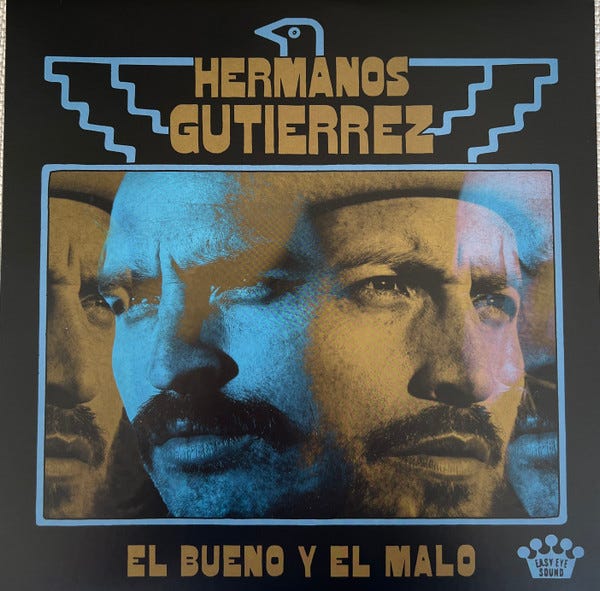
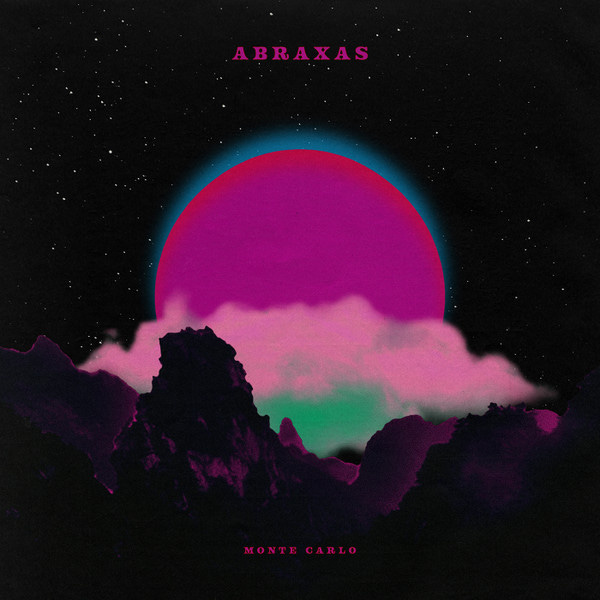



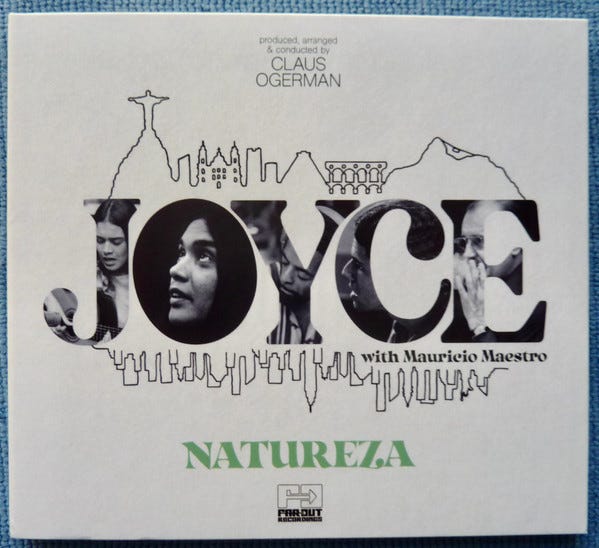
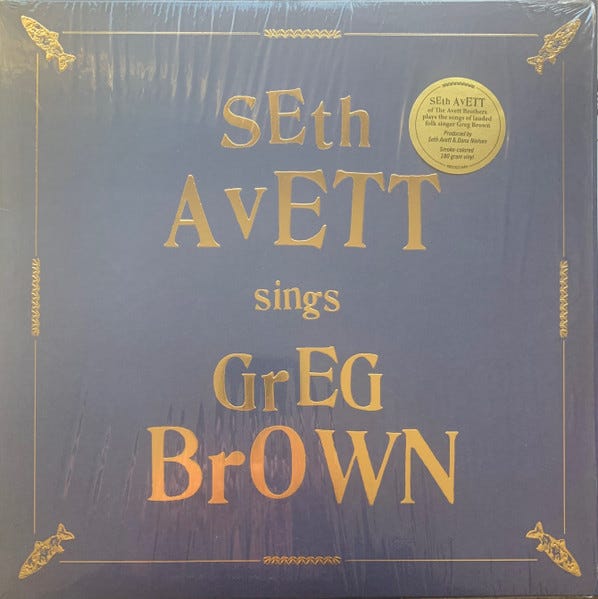


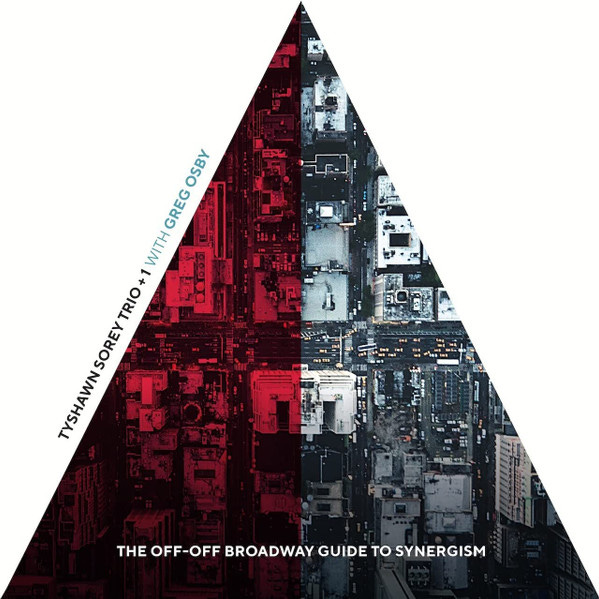

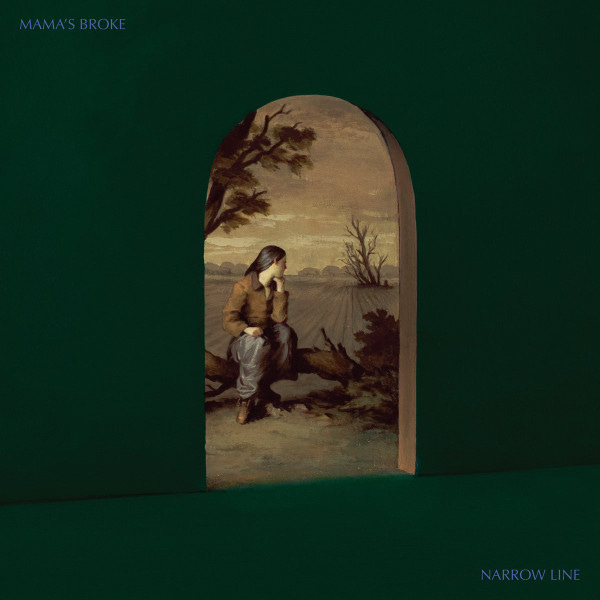




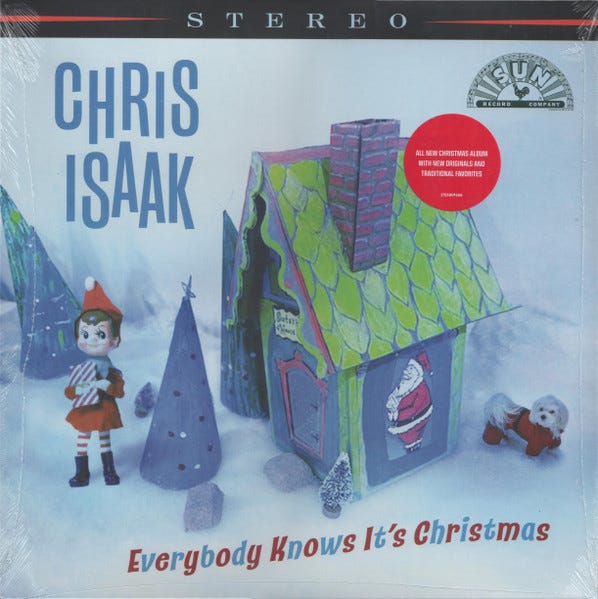
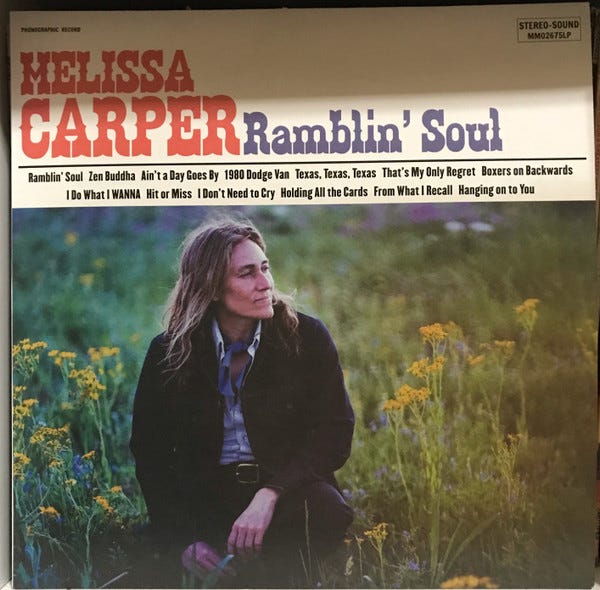
I thought we were off the same mind when we heard that Bruce song. 😹
I really appreciate these monthly overviews. I try to pick out at least 3-4 of your choices each month to check out. Have been reading you since the "Jet Lag" days.